Given the increase in IT security risks nowadays, organizations need to do a better job of managing and securing the devices of their employees, such as smartphones, tablets, and laptops—keeping them in tip-top operational shape while staving off vulnerabilities and threats. To do this at an organization-wide level, they can enlist the help of mobile device management software.
These, together with best practices, can help improve productivity, efficiency, and security by enabling remote control, configuration, and monitoring of devices by the right people with the right skills and know-how. One highly-touted mobile device management software among organizational users is Kandji. The platform is unique because it tears down the walls between InfoSec and IT teams, allowing them to keep devices safe and in tip-top enterprise-ready shape.
But, of course, not all MDM software solutions are perfect. This goes for Kandji as well. In this article, we offer our analysis of the pros and cons of Kandji. This is based not only on a first-hand product experience but also on user reports and testimonies. With this, you can hopefully see whether this go-to solution is right for you.

Pros & Cons of Kandji Table of Contents
Apple users swear by the huge difference in quality between their preferred operating system and its rivals. Objectively, macOS is more robust against malware and security issues. Also, Apple products are much more streamlined not only in their interface but also in their specialized multitasking capabilities. This makes apps running on the platform very snappy. Moreover, the product comes with free yet highly-competitive productivity tools without the bloatware commonly found on Windows systems. Also, Apple has consistent OS and hardware integrations, everything having been designed by just one company. Apple products can be seamlessly integrated with each other to create a frictionless digital ecosystem. This is why Apple is the top choice for many companies and teams, especially in more artistic fields.
Apple Devices: Corporate Use and Challenges
of IT professionals face challenges managing remote devices: 95%
of IT professionals face challenges managing remote devices
95%of IT professionals recommend Apple devices for professional use: 85%
of IT professionals recommend Apple devices for professional use
85%of companies more than doubled the number of remote or hybrid workers in the past two years: 76%
of companies more than doubled the number of remote or hybrid workers in the past two years
76%of companies more than doubled the number of remote or hybrid workers in the past two years: 70%
of companies more than doubled the number of remote or hybrid workers in the past two years
70%Source: Dimensional Research, 2021
Designed byWhile Apple has its own device management solution, Apple Business Manager, it still works best with a third-party MDM for advanced management of devices and corporate data; and, particularly for separating apps and data by corporate and personal usage. This can prove tricky, especially in a bring-your-own-device (BYOD) work culture, which, according to BYOD statistics, is here to stay.
Third-party solutions such as Kandji make everything much simpler, thanks to automation tools and smart endpoint detection technology. They can automatically update and patch an unlimited number of Apple Apps and other software to avoid any lulls in productivity. However, not all solutions are built the same. And while there are great MDM solutions, no app is perfect. Below, we will get to know our featured solution better, discussing the pros and cons of Kandji.
Overview of Kandji
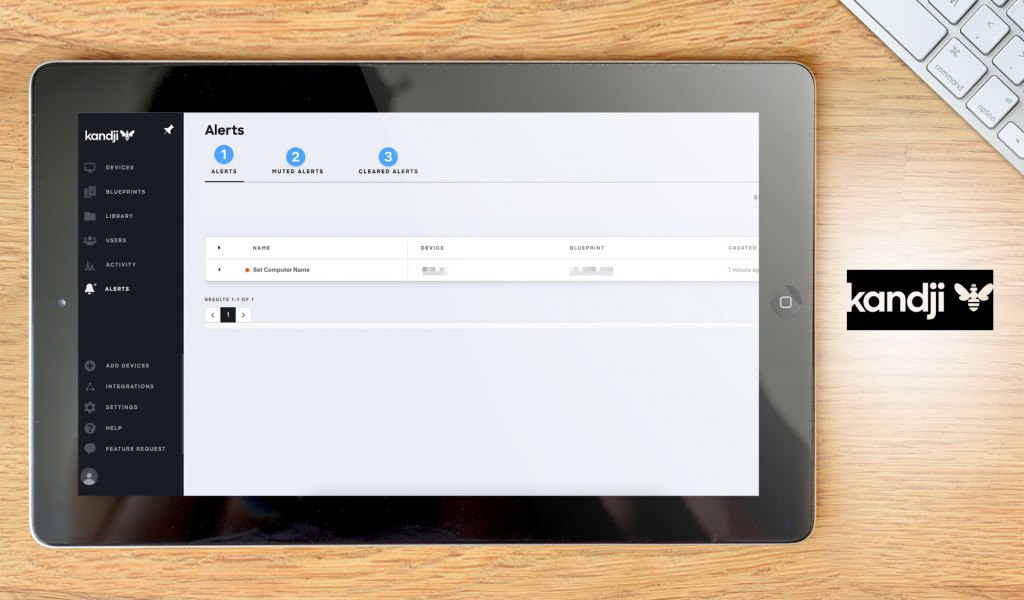
Kandji is a cloud-based mobile device management platform that helps IT and InfoSec teams manage and secure their Apple devices, such as Macs, iPhones, and iPads. Kandji was founded in 2018 by former Apple engineers and consultants with deep expertise in the Apple ecosystem. This expertise allows the company to provide modern and elegant Apple device management solutions for modern business needs. Also, the platform sports an intuitive, clean design reminiscent of the Apple OS, making Kandji easy to use for admins and users.
Kandji offers advanced solutions for device management, vulnerability management, and for endpoint detection and response. It has advanced automation options to provide frictionless experiences on Apple devices, including auto app updates to expedite compliance. Kandji’s unique Device Harmony solution bridges the gap between IT and InfoSec teams, securing the company and its users while enabling high-level productivity. This allows both teams to have a shared view of every endpoint, recognize and remediate risks within a single platform, and provide users with a seamless and native Apple experience. Kandji can search for, identify, and eliminate software vulnerabilities; and provide comprehensive threat detection capabilities for your entire network.
The software also works seamlessly with productivity tools such as Slack, Microsoft Teams, Zapier, and more. This allows users to receive notifications, automate workflows and collaborate with their teams more efficiently. Kandji can support any number of devices and users, from small businesses to large enterprises. Lastly, as the product is rolled out custom to your needs and preferences, it is only available via quote-based pricing.
Detailed Kandji Review
Key Features of Kandji
- Device Management
- Vulnerability Management
- Endpoint Detection and Response (EDR)
- Managed OS
- Passport (SSO)
- Auto Apps
- Migration
- Compliance
- Personalized Onboarding
- Integrations
How can Kandji enhance security training for IT teams?
Implementing and managing a mobile device management (MDM) solution like Kandji involves not only technical skills but also a deep understanding of security best practices. Security training for IT and InfoSec teams is essential to maximize Kandji’s capabilities and safeguard the organization. Here’s how Kandji can support and improve security training efforts:
- Real-Time Security Threat Detection: Kandji’s endpoint detection and response (EDR) features allow IT teams to see firsthand how different types of threats are identified and addressed. Training sessions can incorporate simulated threats to help teams practice threat detection and response within the platform.
- Automated Compliance Monitoring: With Kandji’s built-in compliance tools, IT staff can receive practical training on using these features to meet compliance benchmarks. Teams can learn how to manage and report compliance activities to align with standards like SOC 2, HIPAA, and ISO27001.
- Vulnerability Management Practices: Kandji offers robust vulnerability management, showing IT teams how to identify and prioritize vulnerabilities in Apple devices. Training sessions can focus on effective remediation techniques, allowing IT personnel to address potential weaknesses proactively.
- Customized Alerts and Response Protocols: Kandji enables custom alerts, which can be used to train teams on responding to security incidents based on the organization’s unique protocols. This approach fosters a proactive security culture, empowering teams to respond swiftly to threats.
- Integrated IT and InfoSec Training: Since Kandji combines IT and InfoSec functions, cross-training both teams in collaborative security management can be highly effective. This ensures everyone understands their role in safeguarding devices and data, reducing vulnerabilities from oversight.
Pros and Cons of Kandji
A comprehensive view of every endpoint
Like most mobile device management (MDM) solutions, Kandji provides a complete view of all your device endpoints, regardless of whether they are on-premises or remote. Of course, this is provided that they are Apple devices, as Kandji is an exclusively Apple MDM. So, this only applies to Apple devices like Mac, iPhone, or iPad. This is quite limiting if you are looking for an all-around MDM solution, especially if your company uses a mix of devices with different operating systems. This limitation, however, is Kandji’s strength.
Former Apple engineers and consultants with high-level expertise in everything Apple founded the company. As such, Kandji works seamlessly with the Apple ecosystem, providing a smooth, frictionless experience to admins and users alike. Kandji supports managing all Apple operating systems, including macOS, iOS, iPadOS, and tvOS.
Device Harmony™
Kandji has this unique Device Harmony™ approach that creates a shared reality between IT and InfoSec teams, allowing them to work together in identifying and dealing with risks; and also to make digital tools efficient, increasing employee productivity. With Kandji, they can easily deploy apps, settings, and policies to company devices, monitor compliance status, and remediate any vulnerabilities or threats. The platform also supports Activation Lock, a feature that prevents unauthorized access to erased devices.

Put app and device management on autopilot.
Easy-to-use and scalable device management solution
Kandji allows you to quickly and easily set up apps, settings, and security measures on your Apple devices without needing to do it manually. It can handle any number of devices, from a small number to thousands. With Kandji, you can ensure your devices are secure, meet compliance standards, and are ready for use. Kandji offers over 150 pre-built automations that cover app deployment, patch management, security control enforcement, and compliance standards. You can also create custom automations using scripts or configuration profiles.
Befitting an Apple MDM, Kandji is also easy to use, much like Apple products. Its interface has a clean design reminiscent of macOS, allowing users to access all its features in just a few clicks. It promises an elegant Apple-native experience, and it does so in every sense of it.
Liftoff
Kandji has a neat Liftoff feature that also helps increase the out-of-the-box usability of newly unboxed connected devices. With this, newly opened devices can quickly become enterprise-ready with the right settings, security controls, and apps. Kandji’s Liftoff allows users to see the progress of their device’s initial setup and know when they can start using it. At the same time, it automates many tasks for the administrator to make the process easier.

Make devices enterprise-ready quickly after unboxing.
Combine InfoSec and IT functions in one app
Typically, InfoSec and IT teams work separately. The former keeps the company, employees, and data safe, while the latter focuses on bringing all digital tools up to operational shape. With Kandji, users can access InfoSec and IT tools in one platform. No more switching from one app to another. Everything is in one easy-to-use solution. Its Device Harmony™ solution combines device management, vulnerability management, endpoint detection and response, endpoint visibility, and endpoint compliance together. With these, you can navigate your fleet of devices and take action without incurring extra costs except for your Kandji subscription. And you can ensure productivity levels are optimized, and SaaS security risks are thwarted.
Take note, however, that this comprehensive mix of solutions makes Kandji a true premium platform. As such, it comes with a considerable price tag per managed device. The platform, though, is worth it if you have the budget, given how it allows for low-touch deployment that saves teams a couple of workdays every month. Kandji also provides great customer support, giving clients access to expert engineers to find solutions to any issue quickly. As such, it has been a go-to solution for many leading brands, including Crunchbase, Groupon, and Sisense, one of the best business intelligence solutions on the market.
Detect and thwart vulnerabilities easily
Kandji’s Vulnerability Management feature provides a full view of security vulnerabilities across macOS devices. It has a built-in service in its Kandji Agent that monitors changes to applications on a Mac. This uses Apple’s Endpoint Security framework to detect if any new vulnerabilities have been introduced or existing ones have been fixed. It shows the description, history, and severity of each vulnerability, what software is affected, and which devices have that software installed. This allows IT and InfoSec teams to quickly identify and prioritize vulnerabilities and take immediate action to deal with such issues with Kandji’s built-in software patching and device management tools with minimal effort. With its endpoint detection and response capabilities, users can protect their devices from threats and quarantine compromised devices. So, on Kandji, threats are not only visible but are also actionable on the platform.
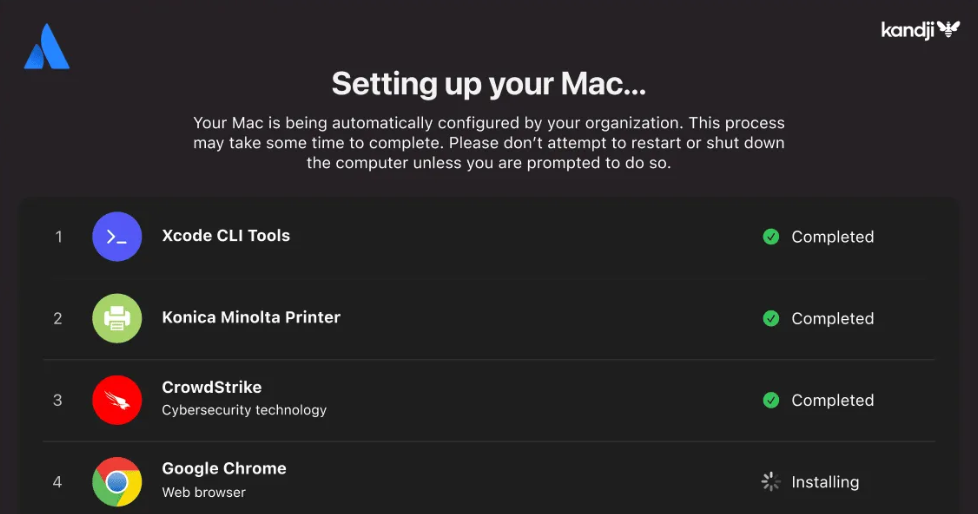
A screenshot of Kandji’s device onboarding progress tracking interface.
Endpoint Detection and Response (EDR)
EDR is a security solution that monitors and analyzes the activity and behavior of endpoints, such as laptops, desktops, and mobile devices, to detect and respond to threats. Kandji’s EDR solution continuously monitors endpoints for malicious activity, such as malware, ransomware, phishing, and data exfiltration. It is also powerful enough to automatically deal with threats using predefined or custom actions, such as quarantining, deleting, or blocking malicious files or processes. Additionally, of course, it has real-time alerts and notifications of suspicious events or incidents via email, Slack, or webhook. This alerts your in-house experts, allowing them to deal with the detected issues themselves if needed. Moreover, it has comprehensive reporting and dashboarding tools for all endpoint security statuses, events, and trends.
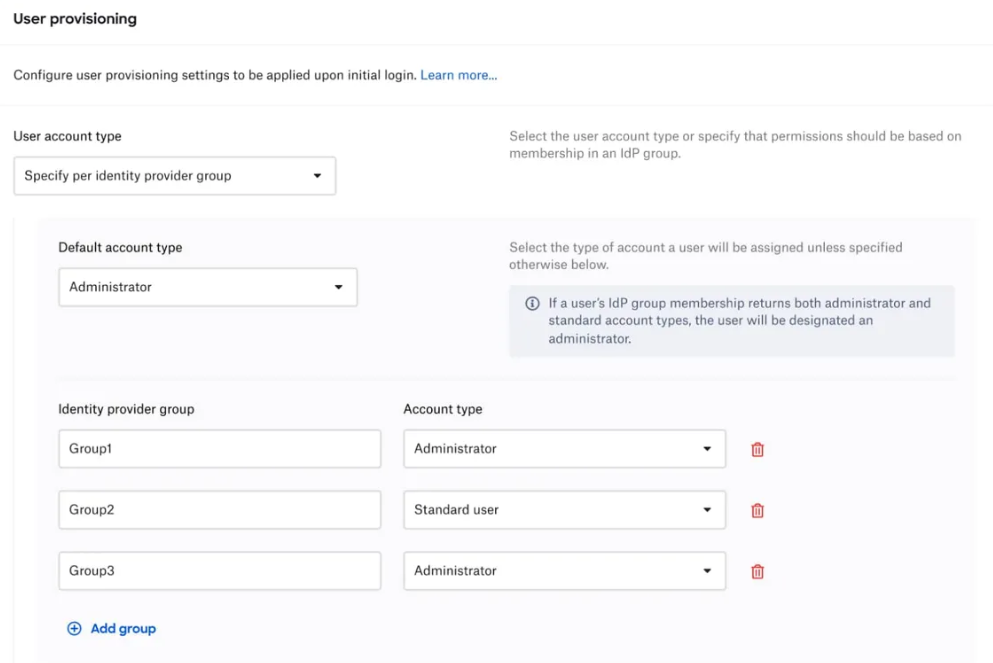
A screenshot of Kandji’s user provisioning menu.
Innovation-driven approach to MDM
Kandji is not only keyed in on everything Apple. It also espouses an innovation-driven approach to its solutions. The company always adds new features to make managing and securing Apple devices easier. One recent addition is a single sign-on (SSO) for administrators, which makes secure password management easier. Its vulnerability management solution is also a relatively recent addition, and it is proving highly useful for proactive risk mitigation. The company is also expanding its security control library to allow InfoSec and IT teams to work more effectively. So, if you subscribe to Kandji, you should expect that you will get updates and upgrades on the fly. This is a big pro that not every other MDM solution really provides.
Integrations
Moreover, Kandji has ongoing work when it comes to its integrations. It accepts requests and makes updates as you go. Currently, it works seamlessly with other tools, such as Microsoft Azure AD, CIS compliance, Drata, and Twingate. It also connects with Okta for advanced automations. This allows users to configure triggers for device actions based on user data. Kandji also provides its API. So, you can connect to tons of applications and set up your custom deployment.
Pre-Built Library of macOS Controls
Kandji boasts the largest library of macOS security controls. Currently, there are more than 150 built-in automations that cover app deployment, patch management, security control enforcement, and compliance standard. You can toggle these controls with one click and execute automations in seconds. The list is growing too. Kandji also provides finer controls over Profiles, controlling key MDM areas such as Privacy, Wi-Fi, System Extensions, and SSO, among others. Moreover, Kandji allows users to deploy any .mobileconfig custom script according to their specifications.
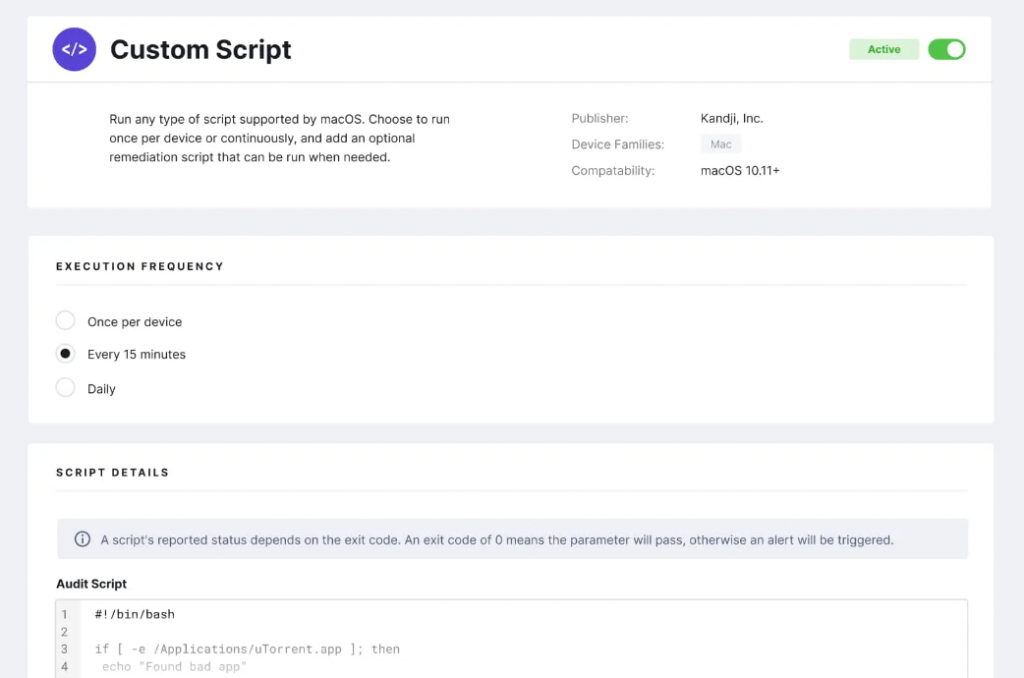
Aside from +150 built-in automations, Kandji allows users to run custom scripts.
Quickly meet compliance benchmarks
Kandji is a CIS (Center for Internet Security) partner and has been awarded the CIS Security Software Certification for CIS Benchmarks. With Kandji’s CIS compliance feature, you can easily map your macOS devices to CIS and NIST benchmarks with a click and reach compliance with SOC 2, FedRAMP, HIPAA, or ISO27001 at record speed. Kandji’s security setting library contains templates for CIS Level 1 and CIS Level 2, which allow you to apply dozens of security settings to your devices in minutes. Kandji also continuously enforces these settings on all devices, even when they are offline, and provides detailed reporting and auditor access to prove compliance.
Free Onboarding, Migration, and Customer Support
One of the benefits of choosing Kandji is that it offers all customers free onboarding, migration, and customer support services. Whether you are switching from another MDM solution or starting from scratch, Kandji will guide you through the process of enrolling your devices, customizing your settings, and deploying your apps. You can also rely on Kandji’s experienced support engineers to help you troubleshoot any issues that may arise 24/5. With Kandji, you can enjoy a smooth and hassle-free transition to a modern and efficient Apple device management platform; and also enjoy access to a customer success manager as a trusted advisor, well-versed in the Apple MDM solution.
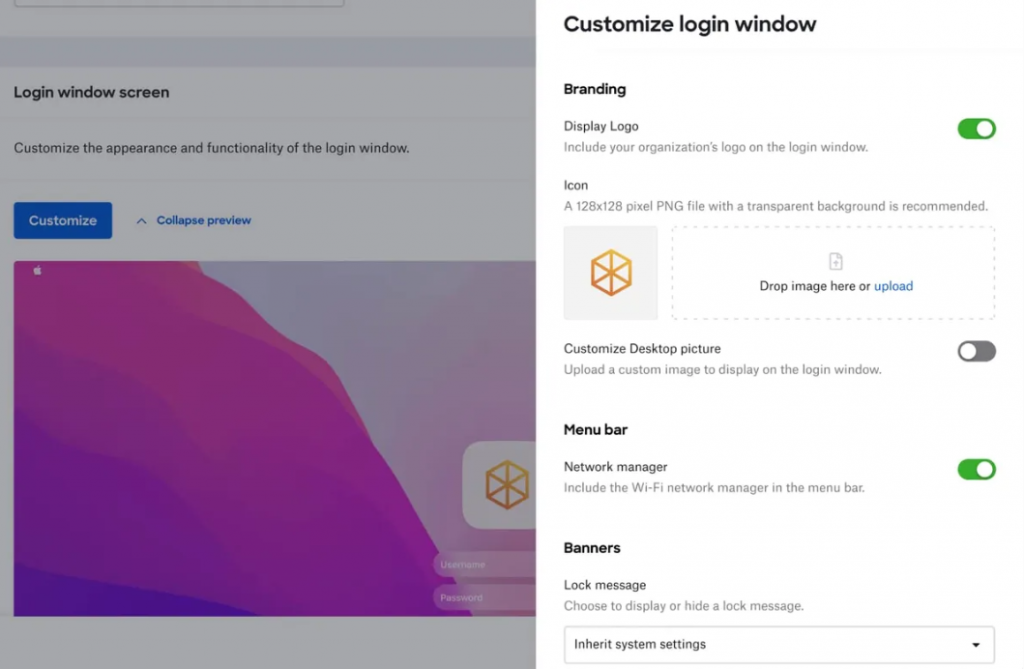
Create a branded experience for employees by customizing login windows.
MigrationAgent
Kandji’s MigrationAgent makes it easy to switch from your current MDM solution to Kandji. It is tailored to meet your specific needs and can be deployed from your existing MDM. The process requires minimal user interaction and can be completed with just a few clicks. Kandji support customizes the agent and its logic to fit your particular needs and requirements. And engineers work with clients until every device is enrolled.
Is Kandji right for you?
Kandji may be right for your organization if you are looking for a comprehensive and reliable Apple device management solution that can help you streamline your workflows, enhance your security, and improve your user experience. It has over 150 built-in automations to enhance security, increase productivity, and meet compliance standards. This allows for low-touch device management, freeing up your IT and InfoSec teams of menial tasks. All of its comprehensive features are packed in an easy-to-use interface. And also, the company is known for providing stellar customer support, giving clients access to seasoned experts 24/5.
All of these really make Kandji a premium option. Depending on your needs, the product can be pricey. Also, being exclusively for Apple devices, it might not be your first choice if your fleet has a high diversity of devices. It does not support Android and Windows. Hence, if you have a BYOD culture at work, Kandji would prove to be quite limited.
Also, you can’t take advantage of applications with OS flexibility, such as employee scheduling software for iOS and Android. So, make sure that you consider your budget, device diversity, and specific needs before making the decision. But if your devices are exclusively or predominantly Apple, then Kandji should be one of your top choices, and, of course, alongside best IT security practices.
Key Insights
- Integration of InfoSec and IT Functions: Kandji bridges the gap between InfoSec and IT teams, enabling a cohesive approach to managing and securing Apple devices. This combined functionality enhances productivity and security within the organization.
- Comprehensive Apple Device Management: Kandji offers a full suite of tools for managing Apple devices, including device management, vulnerability management, endpoint detection and response, and compliance tracking. It supports all Apple operating systems, providing a seamless experience.
- Ease of Use and Scalability: The platform is designed for ease of use, with a clean, intuitive interface. It can scale to support any number of devices, making it suitable for both small businesses and large enterprises.
- Automation and Pre-Built Controls: Kandji boasts over 150 pre-built automations for tasks such as app deployment, patch management, and security control enforcement. This reduces the manual workload for IT teams and ensures devices are consistently secure and compliant.
- Innovation and Continuous Improvement: Kandji is committed to continuous improvement, regularly adding new features and integrations. This innovation-driven approach ensures that the platform remains up-to-date with the latest security and management needs.
- Free Onboarding and Customer Support: Kandji offers free onboarding, migration, and 24/5 customer support, making it easier for organizations to transition to and use the platform effectively.
- Exclusive Focus on Apple Devices: While this specialization makes Kandji highly effective for managing Apple products, it may not be suitable for organizations with a mixed device environment, as it does not support Android or Windows devices.
FAQ
- What makes Kandji different from other MDM solutions?Kandji differentiates itself by seamlessly integrating InfoSec and IT functions into one platform, offering a unique Device Harmony approach. This integration allows teams to work together more effectively to manage and secure Apple devices, improving overall productivity and security.
- Can Kandji manage devices other than Apple products?No, Kandji is exclusively designed for managing Apple devices, including Macs, iPhones, iPads, and Apple TVs. It does not support Android or Windows devices.
- How does Kandji enhance device security?Kandji enhances device security through its vulnerability management and endpoint detection and response (EDR) features. It monitors for security vulnerabilities, provides real-time alerts, and allows for automatic or manual remediation of threats.
- Is Kandji suitable for large enterprises?Yes, Kandji is highly scalable and can support any number of devices, making it suitable for both small businesses and large enterprises. Its comprehensive features and automation capabilities make it ideal for managing large fleets of Apple devices.
- Does Kandji provide support for compliance requirements?Yes, Kandji helps organizations meet compliance requirements with built-in templates for CIS and NIST benchmarks. It continuously enforces security settings and provides detailed reporting to prove compliance with standards such as SOC 2, FedRAMP, HIPAA, and ISO27001.
- What kind of customer support does Kandji offer?Kandji offers 24/5 customer support, including free onboarding and migration services. Customers have access to experienced support engineers who can help troubleshoot issues and ensure a smooth transition to the platform.
- Can Kandji automate device management tasks?Yes, Kandji includes over 150 pre-built automations for tasks such as app deployment, patch management, and security control enforcement. These automations reduce the manual workload for IT teams and ensure devices are consistently managed and secure.
- Is Kandji easy to use for administrators?Yes, Kandji is designed to be user-friendly, with an intuitive interface that resembles the macOS design. This makes it easy for administrators to navigate and manage devices efficiently.
- Does Kandji integrate with other business tools?Yes, Kandji integrates with various business tools, including Microsoft Azure AD, Slack, Zapier, and more. It also provides an API for custom integrations, allowing organizations to tailor the platform to their specific needs.
- How does Kandji support device onboarding?
Kandji’s Liftoff feature streamlines the onboarding process for new devices, making them enterprise-ready quickly. It automates the setup of settings, security controls, and apps, ensuring a smooth start for new devices.



























Leave a comment!